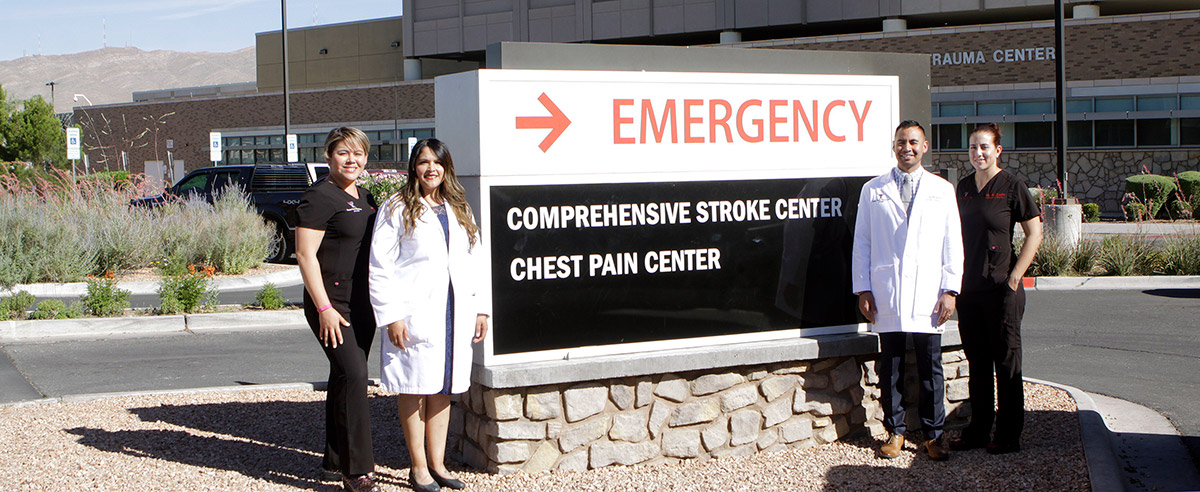UTEP Nurse Practitioners Deliver Comprehensive Stroke Care
Last Updated on June 08, 2018 at 12:00 AM
Originally published June 11, 2018
By Laura L. Acosta
UTEP Communications
Isabel Zuniga was 14 when her family made a painful decision that changed the rest of her life.

After Zuniga’s father suffered a catastrophic stroke, her family chose to withdraw life-sustaining treatment.
“Stroke treatment wasn’t as advanced as it is now,” recalled Zuniga, one of four neurology nurse practitioners in University Medical Center’s certified Comprehensive Stroke Center, the first and only Level 1 stroke center in West Texas and New Mexico.
“I figured if I could help a family from ever having to decide to withdraw care or help them go through making that decision for their loved one, then there was a whole purpose for me to experience that with my dad and get to where I am today,” she said.
Zuniga and her colleagues – Demetria Castrellon, Edwin Lopez and Guillermina Nelson – are all graduates from The University of Texas at El Paso’s Bachelor of Science in Nursing program and Master of Science in Nursing (MSN) program for Adult/Gerontologic Acute Care Nurse Practitioners (AGACNP). They also were key in helping UMC obtain its designation as a Comprehensive Stroke Center by The Joint Commission in March 2018.
“We’re part of the only team in El Paso that provides in-house neurological care to treat even the most complex stroke cases 24 hours a day, seven days a week,” explained Zuniga, a student in UTEP’s Doctor of Nursing Practice program.
The School of Nursing’s AGACNP program is designed to train nurse practitioners to respond to patients with critical life-threatening illnesses, including cardiac arrest, respiratory failure and stroke. Since 2013, more than 100 nurse practitioners have graduated from UTEP’s AGACNP program, the only one of its kind in the borderland.
Students learn how to treat neurologic emergencies such as ischemic strokes, which are caused by blood clots in the brain, and hemorrhagic strokes, which occur when a blood vessel breaks and bleeds into the brain.
“There are lectures on radiology such as reading [CT] scans to determine the placement of the bleed or area of ischemia in the brain that incorporate principles of rapid treatment of stroke,” said AGACNP program director Kathleen M. Cox, DNP.
The Centers for Disease Control and Prevention estimate that more than 795,000 people have a stroke in the United States each year and about 140,000 of them die. It is also a leading cause of serious long-term disability in adults.
In UMC’s Comprehensive Stroke Center, nurse practitioners are part of an interdisciplinary team of neurointerventionalists, neurologists, neurosurgeons, emergency medicine physicians and registered nurses. They work together to provide the highest level of stroke care in a timely manner to improve patients’ chances at recovery.
“There’s a saying in stroke that ‘time is brain,’” said Zuniga, referring to the death of brain cells that occurs when the brain is deprived of oxygen during a stroke. It means that the faster a stroke patient receives treatment, the less damage to the brain.
“From the time the patient comes through the door, we have 60 minutes to assess the patient,” Zuniga continued, “and to do lab tests, give medication, get CT scans and get the patient prepped for surgery to extract the blood clot or send them to the neuro intensive care unit for observation.”
The Joint Commission requires hospitals to have one or more advanced practice nurses (APNs) on its stroke team to be eligible for comprehensive stroke center certification. APNs such as nurse practitioners are expected to support delivery of evidence-based acute stroke assessment and management, provide expert nursing consultation and practice oversight, develop and deliver acute stroke continuing education programs, participate in performance improvement processes, and participate in stroke research.
Carla Escobar, the nurse manager for UMC’s Neurological Intensive Care Unit, said the center’s nurse practitioners provide continuity of care to stroke patients.
“We have three board certified critical care neurologists that run our neuro ICU, and the four nurse practitioners are the next layer along with a layer of residents,” explained Escobar, who will graduate this summer from UTEP’s MSN in Nursing Systems Management program.
“The nurse practitioners are in the ICU from 7 a.m. to 7 p.m. every day providing day-to-day care, and they have a really good relationship with our nursing team because they come from nursing,” she said. “It really makes the orders and patient care elements function seamlessly because they know what we need as nurses, but yet they have the provider background, too.”
According to UTEP School of Nursing officials, more than 60 percent of El Paso nurses earned their degrees at UTEP.
By enabling local students to study and work in El Paso, UTEP’s nursing program is producing nurses who are in demand because they are familiar with the culture and language of the community they serve.
“The benefit of having AGACNPs from our own community is that they know this community and provide culturally relevant care,” Cox said. “They speak Spanish and are members of this community.”
Zuniga, Edwin Lopez and Guillermina Nelson earned their UTEP bachelor's degrees in 2007. Nelson and Zuniga also graduated together from the MSN program in 2015. Nelson said working with fellow alumni is an opportunity to show the community what UTEP grads have to offer.
“Working with all UTEP (nurse practitioner) graduates in the stroke unit at UMC makes me very proud," Nelson said. “I definitely relate better to my fellow nurse practitioners and (I’ve) worked (alongside) them at (patients') bedsides for many years. We all know our strengths and weakness and we know the struggles the (nurse practitioner) community (faces) when it comes to utilizing our role to the fullest potential.”
For more information about UTEP’s nurse practitioner programs, click here.